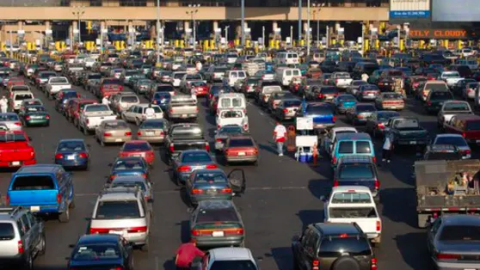This is an independent opinion. Want to respond? Write your own commentary! Email hoa@ivn.us.
From San Ysidro to San Diego, along the border to Brownsville, and in 26 U.S. states, Mexico is our primary trade partner. This goes well beyond cargo shipments. San Ysidro, itself, produces more than $800 million in sales each year. Ninety-five of those sales, on San Ysidro Boulevard, come from border crossers – 70 percent of whom cannot cross today due to US restrictions against tourists being recently extended through July 21, according to the U.S. Customs and Border Protection. No matter how much U.S. states and businesses “re-open,” there is no positive effect on border communities until the restrictions are lifted. Our communities are dying and another month of prohibiting our customers from reaching us will cause much more devastation that COVID-19 ever could.
The way to diminish the spread of COVID-19 is through use of masks, social distancing, hand washing, etc. Restricting border crossings for an arbitrary segment of the public has no rational basis for public good. Recent spikes in infection rates are not due to re-opening the economy or greater travel – they are due to careless and/or ignorant people not abiding by social distancing and personal protective equipment recommendations. Interaction, in large part, between Mexicans and Americans has continued taking place. According to the Mexico 2010 census and the U.S. Embassy in Mexico, nearly 1 million U.S. citizens live in Mexico. In the case of CaliBaja, tens-of-thousands of them are crossing the border every day. There are an estimated 13.2 million Legal Permanent Residents – many of whom, in our region, cross frequently, according to the U.S. Department of Homeland Security.
Not allowing B1/B2 (tourist) visa holders to cross is only destroying economies, and not impacting the spread of COVID-19. Our local governments have been doing an outstanding job at creating policies, procedures and rules to safeguard the public. The San Ysidro Chamber of Commerce is committed to assisting our businesses in compliance with these measures. We can, and will, be safe adhering to this guidance with a fully functioning border – including all facilities at San Ysidro we just spent $741 million reconfiguring.
On a national level, we applaud actions taken to ensure cargo trade has been minimally disrupted and the passing of USMCA. However, cargo is only a portion of our binational trade and well-being. While US trade with Mexico, in terms of cargo (goods), is a deficit, our services trade (which is the exclusive trade, in addition to tourism at San Ysidro — the world’s busiest land port of entry) is at an $8.0 billion surplus, according to the U.S. Trade Representative. This is currently at a standstill.
We are asking anyone who understands the positive impact of our border communities on our economies and livelihood, to call, mail, text and/or visit the White House, insisting current restrictions on our border crossing are lifted immediately.
To our state and local governments - for our economy to recover, we need:
1. Greater relief: State and county fund pools are needed to augment what cities are trying to do. The first round of San Diego’s Small Business Relief Fund was depleted within hours of opening
2. A more proactive approach from government and providers to reach out to businesses for access to relief funds: The vast majority of micro- and small-businesses in San Ysidro have not accessed Paycheck Protection Program, Economic Injury Disaster Loans or city relief packages because funds were announced but not available; banks not accepting applications; owners wrongfully believing they were not eligible, etc. If we can reach out to every business to collect taxes, business fees and assessments, we can surely reach out to them to save their businesses as well. Much of this would normally be executed by chambers of commerce/ business improvement districts. Unfortunately, we have had to furlough our staff because non-profit 501(c)6’s (which most chambers and BIDs are) were deliberately left out of eligibility for PPP and other relief funds
3. All relief programs open to non-profits helping our businesses survive
4. Investment in infrastructure: In “normal” times, 15,000 people cross into San Ysidro, on foot, through our traditional PedEast crossing. Yet, two people cannot walk shoulder-to-shoulder a block north to the chamber’s office due to woefully lacking sidewalk space – now add social distancing to the mix. These types of investing in our neighborhoods for the future is needed now. Each community is different and large municipalities need to make investment based on individual community needs, not cookie-cutters from Broadway.
5. Finally, we must implement a Cali-Baja Recovery Task Force. We must stop working in silos, only giving lip service to binational collaboration. This task force must have governors’ recognition, mayors’ empowerment and ample participation – all toward action, not photo ops and unfulfilled MOUs. As this entire piece outlines, Tijuana and San Diego are interdependent. We are a fabulous, shining example of a binational region when we work together… and dismal when not.
There is a lot of work to do if border communities like San Ysidro are going to survive 2020. The San Ysidro Chamber of Commerce is ready, willing and actively doing our part. We look forward to working with both countries, both states and several municipalities to ensure recovery for us all.
